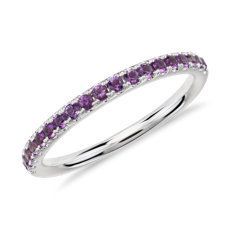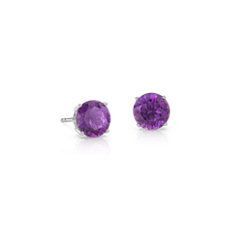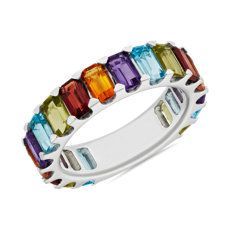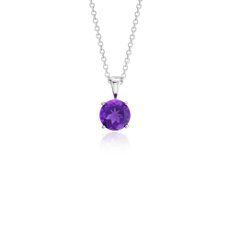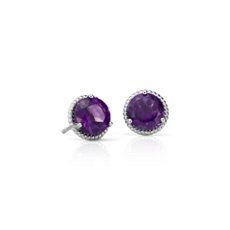A Mystic Fascination
A beginning of amethyst fascination originates in ancient Greece. The name, amethyst, traces its origins to the Greek word, amethystos, which means “cure for drunkenness.” This, in addition to its grape-like purple color, explains its association to the Greek wine god Bacchus.
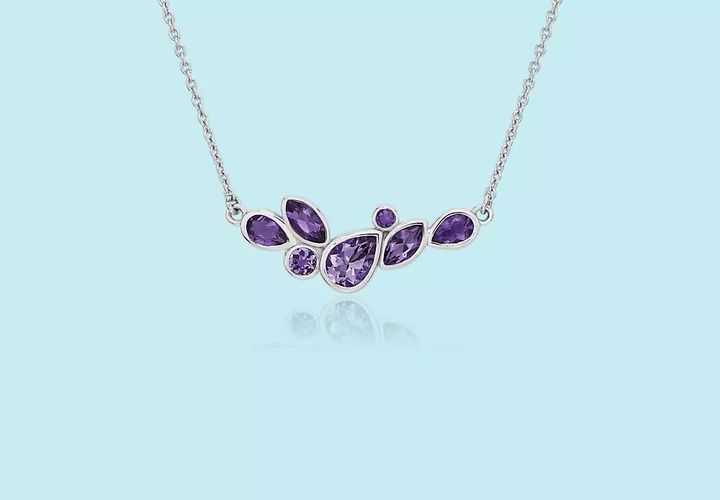
Amethyst's Birthstone History
Appearing as the February birthstone in both modern and traditional lists, amethyst exudes an exquisite air of mystic allure and luxury. Ancient Egyptians donned amethyst amulets to enhance prayer and safeguard against harm. Believing it would increase focus and aid in their safety, medieval soldiers also wore the amethyst gemstone as they prepared for battle. Beloved among the nobility and regal, amethyst gemstones have been featured in the British crown jewels and were a favorite of Catherine the Great of Russia.
A Symbol of Spirituality and
Transformation
Every gemstone has special meaning. Amethyst is a meditative stone rich in metaphysical properties. Many believe it helps awaken inner creativity and evoke inspiration. According to mystical legend, the February birthstone is a token of defense against dark thoughts, eliciting intellect and wit in its wearer. Associated with peace, balance, and courage, many believed that amethysts served as a remedy for insomnia, also alleviating pain. Today, Buddhists commonly use amethysts in Tibetan prayer to elevate spiritual practices.
Amethyst Birthstone's Connection to February
The two zodiac signs for February, Aquarius and Pisces, have ties to the amethyst’s symbolism. The quick-thinking Aquarius connects to the purple gemstone’s associations to wit and intelligence. Pisces, a sign linked to emotional sensitivity, can draw protection from the amethyst.
February Birthstone Meaning
Throughout history, the amethyst gemstone has had many meanings and symbolism. Ancient Greeks associated this wine-colored gem with Bacchus. It was believed that wearing amethysts could increase wit and help the wearer maintain sobriety. Today, February’s birthstone is believed to symbolize purity of spirit and protection. As the February gemstone, amethyst brings an additional meaning of strength and self-reliance.
Shop Popular Amethyst Jewelry
Gifting Inspiration for the February Birthstone
Blue Nile’s range of striking amethyst jewelry makes a special gift for someone, or even for adorning yourself!
A CELEBRATION OF LOVE
Though not traditionally associated with marriage, an amethyst engagement ring is a gorgeous alternative to a more traditional diamond and also the gemstone to celebrate a sixth wedding anniversary.
Captivate your sweetheart with a shimmering amethyst gemstone studded with diamonds. A sleek amethyst solitaire on a delicate sterling silver band, or cushion-cut surrounded by sparkling pavé diamonds makes for an exquisite symbol of your affection.
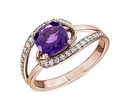
CELEBRATE A FEBRUARY BIRTHDAY
Make any birthday meaningful and enhance that special someone’s style with the gift of an alluring amethyst ring. A modern statement for the right hand, a February birthstone ring flanked by gemstones is a stunning addition to any outfit. For a contemporary flair to the look, choose a pair of chic, emerald cut amethyst stud earrings. Bold and beautiful, amethyst earrings set in sterling silver or gold are a sophisticated way to elevate anyone’s jewelry collection.

GIFTS FOR MOM
With its resplendent lavender and violet hues, the amethyst gemstone exudes elegance and femininity. A dazzling option for Mother’s Day or her birthday, a pendant necklace personalized with her February birthstone is a gift she will treasure. An amethyst pendant necklace, in round, oval, or pear shapes will be the ideal accent to her style.
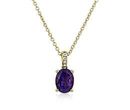
MAJESTIC MILESTONES
Make life’s special occasions even more magical with the gift of enchanting amethyst jewelry. A luminous amethyst bracelet embellished with silver rope detail or signet ering customized with your child’s February birthstone makes a thoughtful graduation gift.

Buying Tips
When buying February birthstone jewelry, consider which hues of purple amethyst best fit your budget. Lighter shades of this February gemstone will be priced lower than deeper hues. All shades of amethyst are valued for their beautiful color and unique properties.
Learn More About Gemstones
Amethyst jewelry’s exquisite style will last a lifetime, and with our selection of the finest pieces, you’re sure to find something you’ll love. Learn about our other gemstone jewelry options in our comprehensive gemstone guide.

